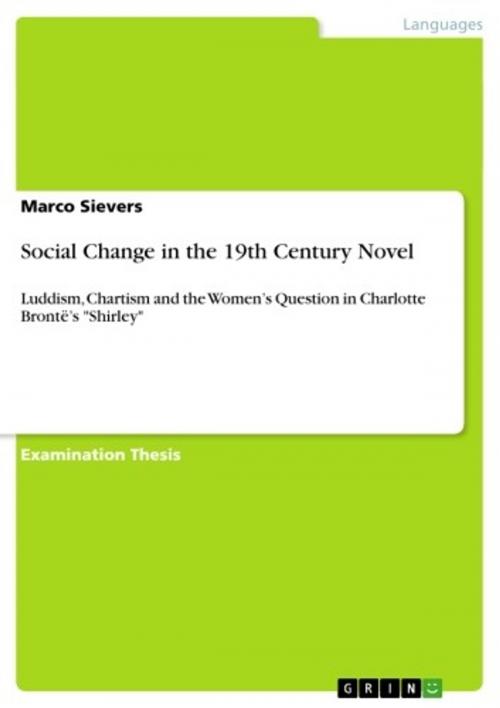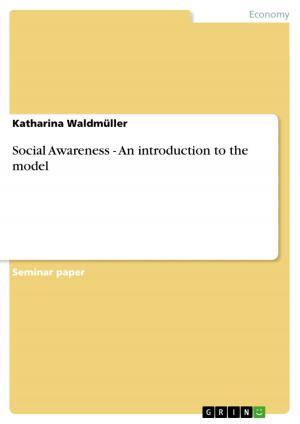Social Change in the 19th Century Novel
Luddism, Chartism and the Women's Question in Charlotte Brontë's 'Shirley'
Fiction & Literature, Literary Theory & Criticism, British| Author: | Marco Sievers | ISBN: | 9783640382590 |
| Publisher: | GRIN Publishing | Publication: | July 24, 2009 |
| Imprint: | GRIN Publishing | Language: | English |
| Author: | Marco Sievers |
| ISBN: | 9783640382590 |
| Publisher: | GRIN Publishing |
| Publication: | July 24, 2009 |
| Imprint: | GRIN Publishing |
| Language: | English |
Examination Thesis from the year 2008 in the subject English - Literature, Works, grade: 1,0, University of Hannover (Philosophische Fakultät / Englisches Seminar), language: English, abstract: The approach of this dissertation is based on New Historicism and Cultural Materialism, and examines the processes of social change in the novel. It contextualises the industrial plot of 'Shirley' on two time levels, on the level of the setting (1811-12) and on the level of the novel's production and publication (1848-49).The study first elaborates on 'Shirley' as a condition of England novel before shedding light on the historical conditions and their representation in the novel's setting. Subsequently, it describes Luddism and Chartism as historical working-class movements, to show that Charlotte Brontë's choice of Luddism was partly motivated by fears of political reprisals, by institutional constraints of the publishing sector, as well as by the power of public opinion. Furthermore, this paper deals with the author's technique of backdating as a strategy to indirectly comment on Chartism. The examination then turns to the novel's representation of the Luddites, and discusses whether the portrayal of the machine wreckers is just a 'lurid travesty', as Terry Eagleton contends (cf. Eagleton, 49). It demonstrates that the novel is based on thoroughly researched historical facts and exhibits an ambivalent attitude towards the weavers, which suggests a Tory and middle-class view on the Luddites. By suggesting paternalism as a solution to the plight of the working classes 'Shirley' not only criticizes prevailing philosophical and economic currents, like liberalism and utilitarianism, but also resembles the cultural criticism of the Scottish historian and essayist Thomas Carlyle. The study also discusses further possible explanations for the peculiar portrayal of the Luddites. By referring to the relationships between the upper and middle classes in the 19th century it demonstrates that the novel can be read as an advocacy of a class-consolidation between the gentry and the industrial middle classes in order to counter Chartism. The religious affiliations of the novel's Luddites and the clergy's demeanour towards the weavers allow another interpretation which foregrounds rivalries between the Anglican Church and dissenting denominations. A third approach relates Shirley to the liberal-progressive Whig-interpretation of history and suggests that the historical setting and the industrial events repudiate this notion by a cyclical idea of history based on suffering and resistance. [...]
Examination Thesis from the year 2008 in the subject English - Literature, Works, grade: 1,0, University of Hannover (Philosophische Fakultät / Englisches Seminar), language: English, abstract: The approach of this dissertation is based on New Historicism and Cultural Materialism, and examines the processes of social change in the novel. It contextualises the industrial plot of 'Shirley' on two time levels, on the level of the setting (1811-12) and on the level of the novel's production and publication (1848-49).The study first elaborates on 'Shirley' as a condition of England novel before shedding light on the historical conditions and their representation in the novel's setting. Subsequently, it describes Luddism and Chartism as historical working-class movements, to show that Charlotte Brontë's choice of Luddism was partly motivated by fears of political reprisals, by institutional constraints of the publishing sector, as well as by the power of public opinion. Furthermore, this paper deals with the author's technique of backdating as a strategy to indirectly comment on Chartism. The examination then turns to the novel's representation of the Luddites, and discusses whether the portrayal of the machine wreckers is just a 'lurid travesty', as Terry Eagleton contends (cf. Eagleton, 49). It demonstrates that the novel is based on thoroughly researched historical facts and exhibits an ambivalent attitude towards the weavers, which suggests a Tory and middle-class view on the Luddites. By suggesting paternalism as a solution to the plight of the working classes 'Shirley' not only criticizes prevailing philosophical and economic currents, like liberalism and utilitarianism, but also resembles the cultural criticism of the Scottish historian and essayist Thomas Carlyle. The study also discusses further possible explanations for the peculiar portrayal of the Luddites. By referring to the relationships between the upper and middle classes in the 19th century it demonstrates that the novel can be read as an advocacy of a class-consolidation between the gentry and the industrial middle classes in order to counter Chartism. The religious affiliations of the novel's Luddites and the clergy's demeanour towards the weavers allow another interpretation which foregrounds rivalries between the Anglican Church and dissenting denominations. A third approach relates Shirley to the liberal-progressive Whig-interpretation of history and suggests that the historical setting and the industrial events repudiate this notion by a cyclical idea of history based on suffering and resistance. [...]















